Bryce Moore's Blog, page 223
May 19, 2014
Classic Noir Goodness: Call Northside 777
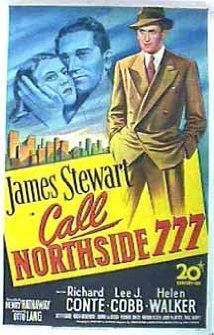 As much as I love classic movies, sometimes I fall into the same trap that I find my kids succumbing to. I’m looking for something to watch, I find something that might be interesting, and then I discover it’s old–black and white, even–and my initial feeling is one of disappointment. Why is that? I love old movies, but sometimes I have to fight the urge to dismiss something because “it’s going to be too slow” or “I’m not in the mood.”
As much as I love classic movies, sometimes I fall into the same trap that I find my kids succumbing to. I’m looking for something to watch, I find something that might be interesting, and then I discover it’s old–black and white, even–and my initial feeling is one of disappointment. Why is that? I love old movies, but sometimes I have to fight the urge to dismiss something because “it’s going to be too slow” or “I’m not in the mood.”
Silly, Bryce.
Call Northside 777 has been in my Netflix queue for quite a while now. I don’t know how it ended up in it. I don’t know how a lot of the films that are in that queue end up there. Magic, I suppose. I see a film, it looks intriguing, I add it, I forget I added it. But one way or another, Northside was there, and I’ve been passing over it for quite a while, too. Some of that ingrained anti-classic prejudice rearing its ugly head.
But come on–Jimmy Stewart? Noir? Why in the world was I avoiding it?
The film’s a solid outing. Stewart is a hard-nosed reporter (with a heart of gold, naturally), who’s assigned to investigate an 11 year old cop killing case. It seems open and shut at first, but as he digs deeper, he begins to wonder if the person who was convicted actually did it. Also noteworthy for being based on a true story. Is it as psychologically complex as it would likely be if done today? Well, no. It definitely irons out the characters into much more of a “good guy/bad guy” sort of thing–although not as much as I thought it would.
Also particularly noteworthy is the way technology plays into the climax. I don’t want to give it away, but I watched it and wondered if audiences sixty years from now will be viewing some of our tech movies the same way I viewed this one.
In any case, it’s an 8/10 for me. Definitely worth your time. Give it a shot.
May 16, 2014
School’s Out for Summer (for Denisa, at least)
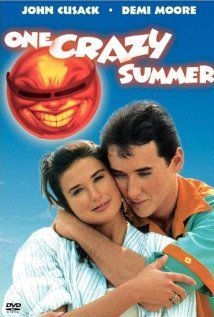 Not like it’s really summer yet or anything, but Denisa’s class finished yesterday, so it feels kind of like that now. Way back in January (when we were given all of two weeks’ notice) when she decided to teach the course, it seemed like it would be nothing but a good thing, although we realized we’d be busier over the semester because of it.
Not like it’s really summer yet or anything, but Denisa’s class finished yesterday, so it feels kind of like that now. Way back in January (when we were given all of two weeks’ notice) when she decided to teach the course, it seemed like it would be nothing but a good thing, although we realized we’d be busier over the semester because of it.
How has it turned out to be?
A good thing, but even busier than we thought it would be. Having both the dad and the mom work in a family certainly makes for a more hectic life, but at the same time, it comes in really handy when you get those surprise bills that pop up from time to time.
In practice, it meant that I came home early from work twice a week, and so I worked at other times to balance that out–so neither a net gain or loss on work for me, just a shift in time. For Denisa, it was a lot of late nights reading the homework before it became due for class, always staying a chapter or two ahead of the students. If she ever gets to teach the course again, it’ll be much easier–but when you’re scrambling at the last minute like she had to, it makes it all much more complex.
Especially since we didn’t really cut anything else out of our lives for the past five months. She kept baking, I kept writing, and she even added in the duties of being Primary President to her schedule.
The good news is that now that it’s over, it feels like we’ll have tons of time again. Of course, I’m sure that will last all of two weeks until we manage to fill up the schedule once more. After all, summer is coming, and that means swim lessons, a trip to Utah, gardening, and yard work. And bugs. Mustn’t forget the bugs. Or the heat. Or the humidity.
Summer is my least favorite season.
But for now, we celebrate the end of a successful semester. Huzzah!
And with that, I’m off to Bangor for the day. Library meetings. Excitement incarnate. See you all Monday!
How did I go all this time without realizing that’s *Demi Moore* co-starring with John Cusak in One Crazy Summer? Man. I disappoint myself sometimes.
May 15, 2014
Dealing with Stress and Work Levels
 Why does it always seem like I’m making one confession or another on this blog? CURSE YOU, HONESTY!!! Today’s confession? How I’ve been dealing with stress is making me more stressed, I think. To understand this phenomenon, we shall turn to Seinfeld. To George, specifically:
Why does it always seem like I’m making one confession or another on this blog? CURSE YOU, HONESTY!!! Today’s confession? How I’ve been dealing with stress is making me more stressed, I think. To understand this phenomenon, we shall turn to Seinfeld. To George, specifically:
See that trick there? I’m worried that’s me, except instead of using it to get out of working at all, I use it to fend off more work from an otherwise crammed plate. In other words, I’m really busy, and instead of declining requests for help because I’m really busy, I’ve been letting people see how busy I am, so that they don’t ask me to do anything else.
But the other morning as I was reflecting on life, the universe, and everything–while I was in the shower, in other words–I came up with the idea that the whole “fake it till you make it” thing works both ways. You can fake happiness, and eventually cheer yourself up out of a bad mood. But can you fake grumpiness and stress, and become grumpy and stressed?
Yes, my friends. Yes you can.
Don’t get me wrong. It’s not like I’ve been faking being stressed. There’s plenty of stress to go around in my life at the moment. But at the same time, by focusing on the stressful things and letting them rise to the surface, I worry that I’m squelching happy things and the ability to just enjoy the good things that are going on in my life.
Why by a grumpy grump all the time, just so I can get out of learning how to say “No” effectively?
Note to self: this might *not* be an effective way to say no, but it’s probably more effective than being perpetually gloomy, much as I love me some Eeyore.
So I’m going to try and focus on the positive for the next while. Try to be upbeat. And when people ask me to do things that I just can’t do or don’t have time for, I’ll try to cheerfully explain that. Here’s hoping it actually works . . .
(Looking over past blog posts, it appears I’ve made this decision before, back in June of 2007. Interesting. That was the tail end of a very long, gloomy period. Grad school rejections, job application rejections–tough times. A month later, I had a new job. Two months later, I was in a new state with a new house and new friends. Things got markedly brighter, really quickly. I’m not sure what–if anything–that had to do with my outlook on life, but it certainly wasn’t hurt by it at all.)
May 14, 2014
More Fun with Family History: Joseph Smith Proposed to My Great-Great-Great Grandmother

A picture of Cordelia
Ever since I’ve discovered that people have entered a whole slew of family stories into the records of some of my ancestors on familysearch.org, I just can’t stop reading them to find out more about where my roots came from. Because people, I’ve got some really funky roots. Here are a few of the things I’ve recently learned:
My great-great-great grandmother Cordelia Calistia Morley Cox lived an extremely interesting life. She was born in 1823. In 1830, her family converted to the brand new faith of The Church of Jesus Christ of Latter-day Saints. (Mormons). Her father, Isaac Morley, played a large role throughout church history, but hers is the life I find much more fascinating at the moment. For example, Joseph Smith proposed to her–asking her to be his plural wife. She wrote about it in her autobiography:
In the spring of 1844, plural marriage was introduced to me by my parents from Joseph Smith, asking their consent and a request to me to be his wife. Imagine, if you can, my feeling, to be a plural wife. Something I never thought I could ever be. I knew nothing of such religion and could not accept it, neither did I then. I told Joseph I had a sweetheart; his name was Whiting, and I expected to marry him. He, however, was left by the wayside. He could not endure the persecutions and hardships. I told the Prophet I thought him a wonderful man and leader, but I wanted to marry my sweetheart.
This later bit won’t make sense to non-Mormons, but it turns out she was later sealed to Joseph right after she was married to her husband in the temple for time only. Asked about it later on, she said:
In eternity I want the man that was the father of my children and was a good husband and father. I lived with him and loved him.
Even despite her misgivings about plural marriage, her husband eventually had three wives, and she was his third. The US government threatened to arrest him unless he separated from two of them, so Cordelia and her sister wife were sent to another property to fend for themselves–against her husband’s desires, might I add. (It’s not like he tried to ditch them. He was given no choice by the government. It was either support one wife and abandon two for a time, or go to prison and abandon all three. Nice choice.)
In any case, while Cordelia and Jemima (the other wife, who Cordelia said was closer to her than a real sister) were at the other property, Jemima was pregnant. When the time came for the baby to come, the only person there was Cordelia. Here’s the next snippet:
One evening I noticed that Jemima was trying to hide her distress. I then realized that the time had come. A terrible fear came over me; a thousand thoughts rushed through my mind. Uppermost was the thought, “What shall I do?” The answer was a knock at the door. I opened it, and there stood a woman, unexpected, who had come to offer her assistance. That night, 29 February 1852, the babe was born in that stable. As soon as everything had been taken care of, and the babe placed in its mother’s arms, the kindly woman left. Neither of us had seen her before, and neither of us ever saw or heard from her again. We have always felt that this was God-given aid, for who but God could have expressed such a keen sympathy or sent more needed help. He did not send to us an earthly doctor, who might appear curious enough to hurt us, but a woman, sympathetic, understanding, and capable.
She also wrote alternate words to the hymn “O My Father.” After reading them, I think I see where my feminist streak might have some roots:
Oh, My Mother thou that dwellest In the mansion up on high
Oft me thinks I still remember When you bade your child goodby.
How you clasped me to your bosom Bade me a true son to be
Once I left my Father’s mansion To dwell in mortality.
How you gave me words of counsel To guide aright my straying feet
How you taught by true example All of Father’s laws to keep.
While I strive in this probation How to learn the Gospel’s truth
May I merit your approval As I did in early youth.
[In heavens journals] Tis recorded You stood by Father’s side,
When the powers that are eternal Thou wast sealed his Goddess bride
How by love and truth and virtue And in time thou did’st become
Through your high exalted station Mother of the souls of men.
When of evil I’ve repented And my work on earth is done
Kindest Father, Loving Mother, Pray forgive your erring son.
When my pilgrimage is ended And the victor’s wreath I’ve won
Dearest Mother to your bosom Will you welcome home your son.
Yeah. Kind of amazing to me what this woman went through and how well she endured it all. Here’s a piece about mob violence she endured as a child:
I have seen hundreds of wicked men ride into town with their guns and bayonets on their shoulders, threatening to take whomever they pleased. Again they took father with about ten others. He begged the privilege of seeing his family before leaving. They gave him a few moments to see us. They had two guards go with him. He called us around him, told us to be good children, and he would come back as soon as he could. He took us one by one in his arms and kissed us good by. You cannot imagine the scene that followed. They were driven to Richmond, Missouri, by a strong guard on horses through the mud and water like so many hogs being driven to slaughter. They kept them well guarded day and night, with nothing but corn bread to eat and water to drink. They had no bed but the floor. They were kept in this condition for three weeks. They were then brought into court to have their trials. The lawyers worked hard to find them guilty of something, but failed. So they turned them out to go home as best they could. So inhumanely was father treated, that when he came back to us, we stared some time before we could recognize and call this gaunt man father. And so it was from year to year, persecution, which increased our faith in our Creator. We were compelled to leave our homes again.
And this is just one person, and a few of the stories of that one ancestor. Maybe this stuff isn’t interesting to you if you aren’t directly related to the woman, I don’t know. In that case, I suppose this is the blog equivalent of me sitting you down and showing you a series of pictures of my kids. But seeing as how I do that on a regular basis anyway, I thought this might be interesting to others, too. Here’s a biography of Cordelia that fills in more details.
Want to see if you have family histories recorded on the site, too? It’s easy. (Or at least it was for me, but remember–I’ve had family members doing family history work on both sides of my family for about 200 years. So I likely have a head start over a lot of you.) You go to familysearch.org and log in or create an account. Once you’ve found where you fit in and see your family tree (use the fan chart option–it’s much prettier and easy to use), click on a name in your tree. It will show you where and when they were born and died, but what you really want to look for is if there are any entires in “Memories.” If there are, click the hyperlink, and you’ll see what goodies you’ve got. It might be pictures, might be birth certificates, or it might be the mother lode: journals and autobiographies.
In any case, just thought I’d share with you. Please let me know if any of you find anything interesting in your family history. Just too much fun.
May 13, 2014
Why Do You People Like Depressing Movies?

I don’t like to whip out the “you people” phrase very often, but this is a self-selecting category (I believe)–and one that I’m most definitely not a part of. Denisa and I watched the Great Expectations mini-series (really just a three hour movie) the last couple of days, and while it’s far from the most depressing film I’ve seen (arguably not really depressing at all), it had plenty of depressing elements to it.
That’s not to say you shouldn’t watch it. There’s some solid performances in it–especially Gillian Anderson as Miss Havisham. The first and third episodes are extremely strong, although the second is a fair letdown. Definitely the weakest of the three. Still, it’s a 7.5/10 for me. And that’s even with my distaste of depressing movies.
But back to that topic. Tear jerkers. I completely, 100% do not understand their appeal. This is a conundrum that goes back to high school. I remember going on a date with my girlfriend to see Circle of Friends, a movie I have somehow managed to completely block from my memory, even if the date itself still is memorable. Memorable, because I can still remember looking over at my date toward the end of the movie to see her sitting there sobbing. And then I looked around the theater and saw another guy there with his date, and she was sobbing too. And that guy and I exchanged a look that said “Do you have any idea why in the world they’re enjoying this?”
And the answer was clear: no. No we did not. (Jaimey, do you happen to remember this movie? Care to offer me an explanation almost twenty years after the fact? I really should have just asked you at the time . . .)
If it’s a movie based on a true story–Schindler’s List or Saving Private Ryan, to name two Spielberg samples–then I get the idea behind it. Present history as accurately as drama will allow. But what about made up dramas? I simply don’t get how watching (or reading) something that turns out to be nothing but a downer . . . can be entertaining.
It’s why I stopped watching Mad Men. The show was about awful people doing awful things to each other, and I never really saw any signs that things were ever going to get any better. I have enough awful in my life without inviting it in through the television screen. Is it because if you watch a movie about people who have worse lives than you do, suddenly your own life seems brighter in contrast?
I’m not trying to be pithy–I really would like to know.
Of course, I’m not sure why I want to know. I have no real desire to change–to become the sort of person who likes depressing movies. But I’m usually all for understanding where other people are coming from, and this is one area that I could really use some pointers on. So please enlighten me.
May 12, 2014
Games, Rules, Courtesy, and Cheating
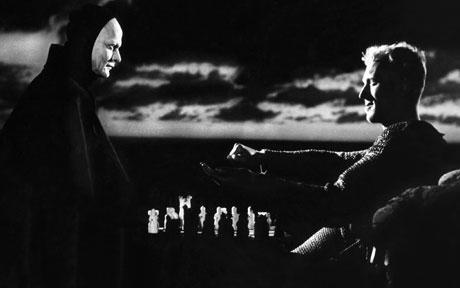 I’m a competitive person by nature. I’ve always loved playing games, but–here’s the confession–I’ve loved winning them more. I don’t typically play to just have a fun time. I have difficulty turning off the desire to win, even when I really should be able to. I’d play a lot of games growing up–against my siblings or my cousins or my friends–and the goal was always the same: win.
I’m a competitive person by nature. I’ve always loved playing games, but–here’s the confession–I’ve loved winning them more. I don’t typically play to just have a fun time. I have difficulty turning off the desire to win, even when I really should be able to. I’d play a lot of games growing up–against my siblings or my cousins or my friends–and the goal was always the same: win.
I don’t consider myself to be a sore winner or loser. Once the game is over, I tend to calm down fairly quickly, unless it was a really close game. In that case, it takes me some time to get a return to normalcy. Even while the game is going on, I usually am enjoying myself–again, unless it’s a really close game. The more I become invested in a game, the more I start focusing on winning at all costs.
And there’s the question for the day: where do I draw the line for “at all costs”? I don’t cheat. For me, the only way to win the game is by winning by the rules. But I’m really a stickler to those rules, and sometimes that gets me into trouble.
The thing is, often the person who wins any game is the person who understands the rules most completely. I’ve always been a person who lives and dies by the rulebook. If someone pulls out a rule that gives them advantage–and they can prove it in the book–then I’ve considered that to trump my objections. This is sometimes the hardest part of a game to face. I remember a few years ago when I was playing Settlers of Catan and used a settlement to break up someone else’s longest road. They were convinced that didn’t matter–that settlements couldn’t break longest roads. I showed the part in the rules where it said otherwise.
The result wasn’t pretty. (Probably because by breaking that road, I gave myself the longest road, and thereby the win.)
So what do you do when the person you’re playing against doesn’t understand the rules of the game you’re playing. This is where I get myself into hot water sometimes. See, I like playing games against other people. Playing against myself just doesn’t have the same thrill. But if I have to help another person too much, then it feels too much like I’m just playing solitaire. There’s a fine line, then, between helping my opponent and biting my tongue to let them lose. Because on the other hand, how much fun is it to win if I only win because they didn’t understand what in the world they were doing?
In an ideal world, what I do is explain the rules fully and properly, and then answer any question they might have as accurately as I can, but let them play from there on out. This seems cut and dried, but I had a situation the other night where I was playing in an MTG draft. My opponent was misplaying, and I knew it. He/she was also beating me soundly, despite the fact that I felt like I was the better player. I was faced with a decision: should I explain what the proper rules were, as the better player? Or should I just let my opponent misplay.
Since I was getting trounced, I allowed the misplays to continue. I feel fairly guilty about it now, actually. Looking back on it, I think the right thing for me to have done would have been to note that the rules weren’t being carried out the right way, and then to explain what the right way was. After that, I could have just continued to play without feeling guilty. If mistakes were made, I’d know they wouldn’t have been because of anything I was doing.
Of course, because karma is a thing, that first game went far too long, and although I won the second game (without needing misplays by my opponent to save me), there wasn’t enough time for a game 3. I ended up getting a draw instead of a win or loss. I’m fairly confident that game 3 would have gone in my favor. I had a stronger deck and had sideboarded well, and I knew what was going on in my opponent’s deck well enough that–barring getting really unlucky–I should have taken it easily. But because I’d bit my tongue, I didn’t have time to eke out a win.
But still, how do you decide when your opponent didn’t know enough? In my game of Catan, I won due to a rules question. My opponent had no idea that rule existed, and so he played one way. I knew about it, and so I played another. By the end of the game, so much of our strategies had depended upon our individual knowledge of the rules. There was no way to “take it back.” If we played without the rule, I would have lost. Playing with it, I won. Neither side could really feel good about his victory or loss.
The answer, of course, is to not take games so darned seriously. But since I don’t appear to be able to do that, I’m not sure if there really is an answer. And so I almost always fall back on the rules. I rarely care about who wins or loses the first three or four times I play any game. The rules aren’t defined enough in my mind to be able to expect to win by skill. But once both sides have played a game a fair bit, then I think it’s up to each side to know the rules and play by them. You correct infractions as they arise, but I see my opponent making some really dumb strategy errors–and they’ve played the game a bit–then I let them make them, since I know they know the rules.
Who knew playing a simple game could be so complex?
Any serious board gamer, that’s who.
How about you? Do you game? What do you do when you come across tricky situations like these?
May 9, 2014
My Writing Process
 I was recently tagged by Melanie Crouse in an ongoing sort of blog tour, where authors discuss their writing process. I didn’t have anything on the slate for today’s post, so it seemed like a perfect time to answer some questions about it. Ready?
I was recently tagged by Melanie Crouse in an ongoing sort of blog tour, where authors discuss their writing process. I didn’t have anything on the slate for today’s post, so it seemed like a perfect time to answer some questions about it. Ready?
What am I working on now?
At the moment, I’m working on something that started as a heist book and has since morphed into a school book. Take Harry Potter and drive it into Ocean’s Eleven at about 88 mph, and you’ve got an idea where I’m coming from.
How does my book differ from others within its genre?
I’m not actually sure my book really has a genre. That’s not always a good thing. It makes it so that it’s easier to compete against other books, but it’s harder to convince people that there’s a place for it in publishing.
Why do I write what I do?
For me, it’s simple: I write what I’d like to read. I’m a librarian, and I read and watch a fair bit of media. I have a fair idea what else is going on in the field, and what’s already been done. I like doing things that aren’t already out there. With VODNIK, I chose to ignore vampires and werewolves and explore a different type of folklore from a different culture. With TARNHELM (out with editors now), I took a love of noir and brought it to fantasy because it wasn’t something I’d seen before. With THE MEMORY THIEF (also currently on submission), I explored a memory-based magic system–again, something I hadn’t seen.
If it’s already out there, why should I bother trying to recreate it? I like putting my own spin on things. Often that means breaking new territory, though sometimes it’s just twisting something that’s already there and turning it to my purpose.
How does my writing process work?
I really wish I knew. I’ve been writing steadily every day for over a decade. Sporadically for longer than that. I’ve finished 11 novels and gotten a fair bit through 5 other false starts. Each time, my process has changed and evolved. If you’d asked me five years ago what it was like, I’d have told you that I did a lot of discovery writing, but that I was wanting to switch to being more of a plotter. These days? I’m back to discovery. I write to find out what happens next.
That brings me a lot of advantages. My characters surprise me with what they do and what they’re capable of. The plot can take unexpected twists. But it also creates problems for me: I usually have to return to what I’ve written and revise it fairly extensively. I’d say I don’t really understand what a book is about until I’ve finished the first draft. The revision is then a process of going back through that first draft and honing it into my final vision.
As for the actual writing, I’ll start with an idea for a book, and start writing that book. Often I’ll soon discover that I want to write a scene, but that scene won’t make sense unless there’s a previous scene to set it up. So I’ll go back and write the previous scene. I’ll continue in that manner, writing forward and taking pauses to write backward–until I get to the point where I’ve set everything up and can just finish the book. That usually happens about the halfway marker of the book. By that time, I know what’s going to happen for the rest of the novel, and it’s just a matter of sealing the deal.
I write six days a week, 1,000 words a day. I don’t believe in muses. Writing is a job, just like my library day job. I don’t only go to work when I feel like it. You don’t get that choice. It’s the same for writing.
Anyway–that’s where I am for now. Ask me again in a year or two, and I’ll probably tell you something different. The key thing for me is to keep writing. Whatever I have to do to keep things interesting and alive, I’ll do that. Explore it. Experiment with it. Writing has to be fun for me. If it stops being fun, it all becomes wooden.
Any of you out there read this and want to be tagged yourself? Just let me know–I’ll include a link here to your blog post, wherever it might be. Just answer the same questions, and link back to this post. I’d love to hear about other writing processes.
May 8, 2014
An Historical Look at Rape: Anatomy of a Murder
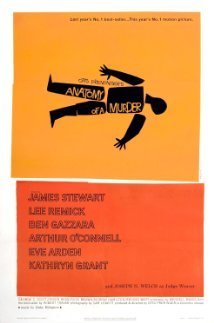 Anatomy of a Murder just popped up for viewing on Netflix Instant, and it’s a movie I’ve long wanted to see but never got around to, so it didn’t take me long before we watched it. Jimmy Stewart. 7 Oscar nominations. It’s pretty much a must watch in Bryce’s universe, just for the context.
Anatomy of a Murder just popped up for viewing on Netflix Instant, and it’s a movie I’ve long wanted to see but never got around to, so it didn’t take me long before we watched it. Jimmy Stewart. 7 Oscar nominations. It’s pretty much a must watch in Bryce’s universe, just for the context.
What did I think about it?
I’m not sure it entirely “works” as a movie in today’s age. As far as being an important film, I definitely still think it is. It was one of the first “courtroom dramas,” and it blazed new ground for that. Of course, we’ve had a lot of courtroom dramas since, and they’ve evolved quite nicely, which means that it’s hard for this one to compete against the later evolutions.
But it isn’t just that.
The thing that really kept getting in the way of me enjoying the movie was the way it treated women and–specifically–rape. The plot set up is simple: a man’s wife is raped. He goes and finds the rapist and shoots him dead. Jimmy Stewart is his lawyer. Where things get tricky is when you start looking at the people involved. The wife who is raped is a coy little minx, even the day after being supposedly raped. The husband is a cold heartless jerk, and it seems quite clear that he’s totally aware of what he did. He’s a controlling husband, and quite possibly abusive.
I actually liked the film for this. We as viewers aren’t entirely sure what happened. Did the wife really get raped, or was she actually caught by her husband and beaten for running around behind his back? As the movie progresses, our opinions change based on the information available to us.
That’s a good thing. Complexity, yay.
But there were areas where the movie completely lost me. The wife loses her panties over the course of the rape, and when that fact is brought up at trial, the entire courtroom bursts out laughing. Really? Nothing about that was remotely amusing. It was just a non-sequitur that the audience would find it funny. That’s the best example of it, but the idea behind it kept coming back again and again.
Today, rape is taken extremely seriously. Back in 1959 when the film was made? It’s pretty clear that it wasn’t. Murder, yes. Rape? It’s sort of shrugged off like a thing that just happens sometimes. Not a good thing by any stretch, but far from the worst thing.
Because of that treatment, I kept getting jarred out of the film. Not really the film’s fault–it’s a product of its time–but it makes it hard to become engrossed as a viewer. I actually think things like this are really helpful in some ways. They let us see how society has changed over time, and that’s interesting from an academic standpoint alone.
In the end, I still think I liked the movie. The complexity saved it. I’d give it a 7.5/10. Maybe an 8, because it’s got a score by Duke Ellington (and a cameo by him), and that alone is worth some extra credit. I recommend the movie, but I’d really like to hear from some other people who have watched it recently. Was I off base? Let me know in the comments.
May 7, 2014
Anticipating Interest: Writing Great Blog Posts
 (HUGE bonus points if you get the connection of that picture to today’s post.) So I’m happy to be able to report that yesterday’s rant against the anti-social network crowd has taken the title of “Most Viewed Post in a Single Day” on my blog. It beat the former record holder (a post I wrote about getting along in politics the day after the Romney/Obama election) by about 50%–so it wasn’t even close.
(HUGE bonus points if you get the connection of that picture to today’s post.) So I’m happy to be able to report that yesterday’s rant against the anti-social network crowd has taken the title of “Most Viewed Post in a Single Day” on my blog. It beat the former record holder (a post I wrote about getting along in politics the day after the Romney/Obama election) by about 50%–so it wasn’t even close.
I’m always pleased when one of my posts strikes a chord with readers. It’s a great feeling when strangers start sharing it and using my words to talk about how they’re feeling. I write the posts to be read, after all. If no one reads them, it takes some of the fun away.
But one thing I’ve learned after doing this for a while is that there’s really no way of knowing which posts of mine will strike that chord, and which will disappear with barely a ripple. Both my record holders–yesterday’s post and the one about politics–were knee-jerk essays that I wrote off the cuff. I talked about something I felt strongly about, but I didn’t think too much about it. I just typed them up and hit post. There are other posts that I’ve spent a lot of time on–really working over and debating–that have fallen flat on their digital faces.
Case in point? Friday, I wrote a post about diversity in literature. It was timed to coincide with the big #WeNeedDiverseBooks movement. I spent a lot of time thinking about the topic, and a fair bit of time editing the post. I was very pleased with it, and I thought it would get a fair bit of views. Instead, it ended up with 27 views for the day. Total.
I don’t know about other people’s statistics, but that’s definitely well below average for me. And part of me wanted to be depressed and sad about it. I had this thing that I spent time on, and nobody saw it or liked it.
But I didn’t let it get me down. Why? Because it was one post out of (let me check) over 1,700. I don’t have time to care about every single one. And I realized then–as I do now–that I don’t have a ton of control over what people think of my writing and do with it once it’s published. I just move on to the next post.
I think that’s a saving grace for me with my books, too. I don’t just write one and then have my agent send it out, with me holding my breath the whole time that an editor will buy it. Nope. I’m already on the next book. The next project. So that when those rejections start coming in, I’ve got some space between my feelings and my writing. It’s not as hard that way.
So in any case, yay that people liked the post. Thanks all for sharing it. Never feel like you need permission to share (not cut and paste, mind you–share) my posts. The more people who read them, the merrier.
May 6, 2014
That Video About Putting Down Your Smartphone? Hogwash
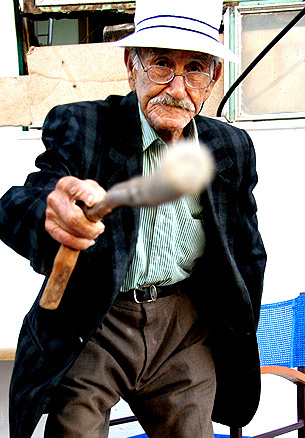 Ugh. I finally watched that video that’s been making the rounds on Facebook–the one with the Brit talking in rhyme about how we all need to put down our smartphones and start living in the moment. If you haven’t seen it, here it is:
Ugh. I finally watched that video that’s been making the rounds on Facebook–the one with the Brit talking in rhyme about how we all need to put down our smartphones and start living in the moment. If you haven’t seen it, here it is:
The thing’s gotten more than 20 million views on YouTube so far, and it irritated me to no end. Not because I don’t agree with some of the sentiment (I’ve blogged about a similar topic before), but because I think this particular version of the argument is the technological equivalent of some old guy yelling at the neighborhood kids to get off his lawn. All it’s missing is the cane being shaken.
I don’t disagree that people are on their phones too much. I go to the school cafeteria, and I see whole tables where the students are just checking their phones instead of talking to each other. That certainly concerns me, but at the same time, as soon as I find myself arguing that, I begin to wonder. Wonder if I’m not turning into that old guy, reaching for his cane.
Technology is changing all the time. It’s inevitable that it’s going to change us along with it. Any time you’re the one standing on the street corner calling for all the other people out there to stop using technology, you run the risk of being this guy:
“If men learn this, it will implant forgetfulness in their souls; they will cease to exercise memory because they rely on that which is written, calling things to remembrance no longer from within themselves, but by means of external marks.
What’s he talking about? Writing. As in, writing stuff down. Who is he? Plato. I’m as big a fan of Plato as the next cave, but I hope most of us can agree that writing was a fairly good thing, taken as a whole.
Back in 2010, the warning of the day was against the internet and information overload, but this article does a fine job of detailing how we as a species have apparently been in constant fear of change and disruption coming to life as we know it. In this case, I’m much more likely to listen to another smart guy: Douglas Adams, author of The Hitchhiker’s Guide to the Galaxy:
“I’ve come up with a set of rules that describe our reactions to technologies:
1. Anything that is in the world when you’re born is normal and ordinary and is just a natural part of the way the world works.
2. Anything that’s invented between when you’re fifteen and thirty-five is new and exciting and revolutionary and you can probably get a career in it.
3. Anything invented after you’re thirty-five is against the natural order of things.”
What we’re seeing with smartphones and social media and Google Glass isn’t the end of the world. It isn’t the end of society, either. It’s just growing pains as we come to terms with new technology and the implications it has for our lives. The pains are more severe simply because technology is changing so quickly that we’re having a harder time keeping up with it.
What ticked me off about this video in particular is that its basic argument appears to be that participating in social media makes you anti-social. As far as I’m concerned, that’s pure garbage. I’m not going to argue that there are plenty of people who aren’t using social media as well as they might, but I have many close friends because of social media, not in spite of it. I’m not naturally a “go out and talk to strangers” sort of a guy. In days gone by, I would have far fewer friends than I have right now.
Social media is fantastic. It helps me stay in touch and communicate with so many people I wouldn’t be able to otherwise. I for one am very grateful for it. I continue to be in touch with friends in Utah and Pennsylvania. Family in Texas or Arizona or Idaho. I use it to hold my writing groups. It’s a part of my life that makes things better for me, not worse.
The video also makes the argument that people are too busy documenting their lives instead of living their lives. Again, what a bunch of baloney. You might as well argue that we should ditch cameras or video cameras. These devices help us stay more in contact now than ever before. Yes, that changes the game a fair bit, but to me, smartphones and technology are incoming waves that can’t be stopped and shouldn’t be ignored. We all have a choice to make: we can stomp our foot and pout that life is changing–we can let that wave overwhelm us or pass us by–or we can use that wave to propel us to interesting new heights and places.
Sink or surf, baby.
Should we be thoughtful before we whip out the smartphone in the middle of a movie or date? Of course. Should we talk to the people we’re with instead of constantly interrupting those relationships so we can text? Sure. But don’t try to argue with me that we should leave our phones home entirely, or give those things up.
After all, HAVEN’T YOU PEOPLE SEEN ANY HORROR MOVIES?
Leaving your phone home is just what the zombies want you to do, people.
In any case, I’m sure I’ll continue seeing it posted, but for now, I’m done with that video. Sorry people. I ain’t buying this one.



